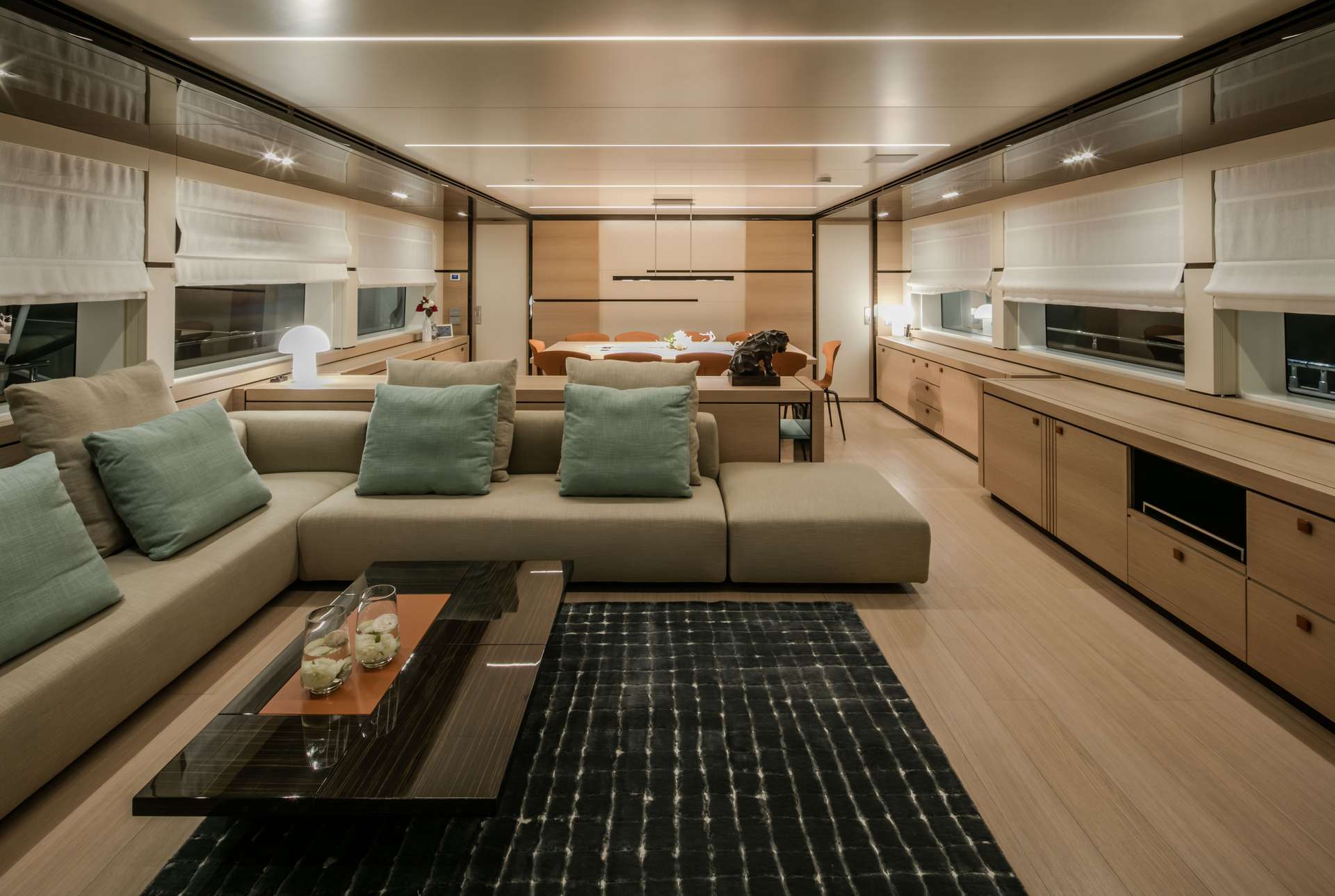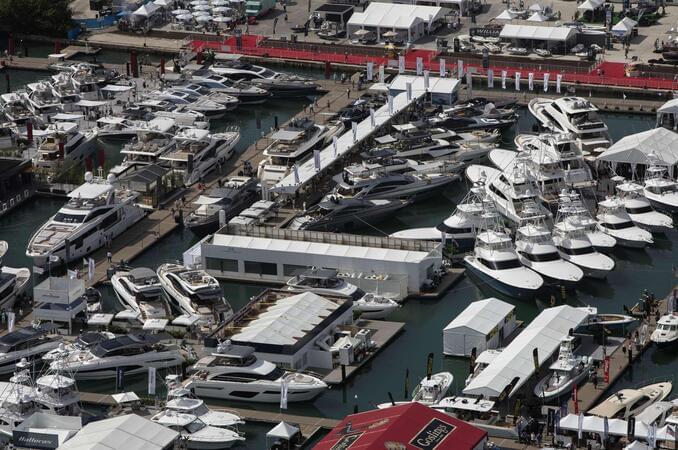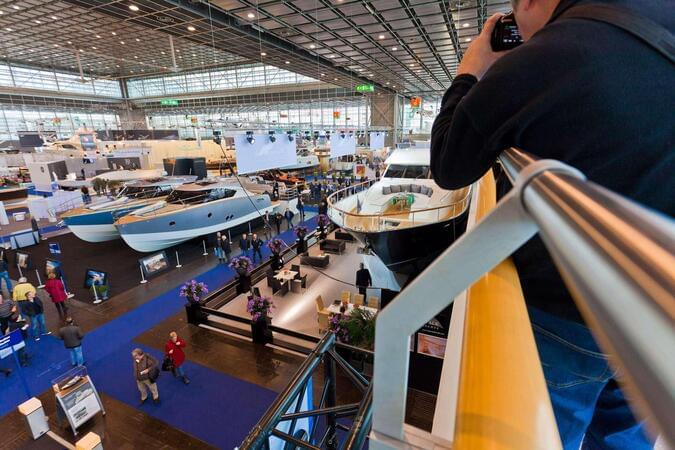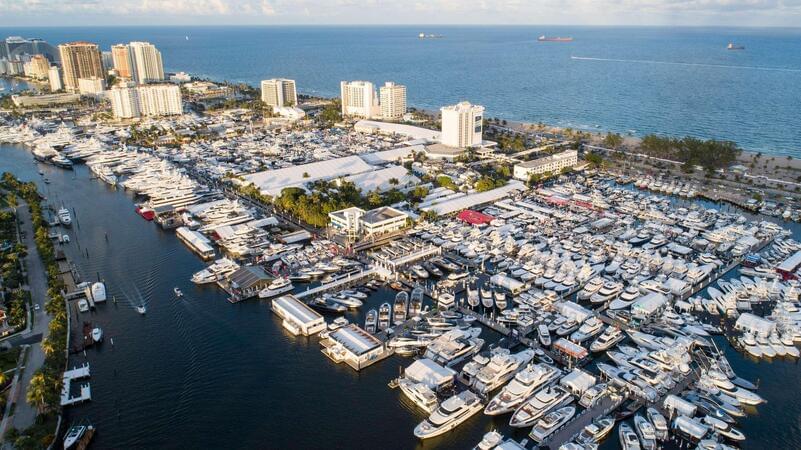

Super Hyhmä, Nauta Air 111, has been designed and built by Cantiere delle Marche to the highest standards to fulfil a very demanding and experienced Owner's requests, specifically to cruise the Northwest Passage and documenting the marine wildlife during the trip in the Med and across the Atlantic. Hyhmä is the fourth and the biggest yacht of Nauta Air line yacht, with a length overall of 33.83m (111ft) and 7.80m (25,59ft) beam and 315t displacement, Hyhmä can host up to 12 guest in 5 suites and 7 crew members. Two Caterpillar C18 Heavy Duty developing 500kW each push the Nauta Air 111 at a max speed of 13 knots (half load) with a range of above 5500nm at economic speed. For those who love numbers and symmetry: Hyhmä's LOA is 111 feet, a palindrome number that converted into metrical system becomes 33.833 metres, another palindrome number
From a Naval Architectural perspective the design brief of the Nauta Air 111 was highly restrictive on the main dimensions of the yacht. Beam, length and height were firmly fixed in the design and it was up to the naval architects to create the appropriate underwater body fitting inside this box. The intended use of the vessel is worldwide exploration in high comfort, a specific experience for Vripack. In order to achieve this goal the wave dampening aft body has been designed as a sloping S curve on the aft of the water lines which is connected to sharper bilges. Her high bow and bulbous bow - which is a good wave- cutter - combined with an almost flat, gentle deadrise from about midship aft, grant excellent seakeeping and seaworthiness. Other examples of efficiency and resistant reducing efforts are the U shaped shaft brackets which improve the wake field to the propellers and the bigger propellers which all contributes to higher efficiency. Thicker scantlings, protected appendages, equipment redundancy and long range fuel and lot of storages are among the features which allow Hyhmä to head out on long journeys also in ice sea as crossing the North-West Passage is among her Owners' plans. The hull’s shell plates are dimensioned as an ice breaker: 20mm thick on the bottom and 12mm from the bottom to the chine. The skeg and the central keel's steel plates are 20mm thick while the hull sides at water line level has been reinforced with steel plates 22mm thick to resist to impact with ice.
From the profile, there is little doubt that Hyhmä is an oceangoing vessel.
The lines for the three decks, topped by an elegantly shaped T-top, are straight with no sheerline. Nevertheless the horizontal development of all lines from bow to stern provide for a sense of dynamism while composing well proportioned volumes.
A luxury vessel, Hyhmä is a crossover between a go-anywhere expedition yacht and a contemporary 'navetta' and she encompasses all qualities and characteristics that have made CdM's reputation. This yacht has many surprises up her sleeves that need time and attention to be absorbed and fully appreciated. With her nicely designed details and cohesive design, she feels much bigger inside and has facilities you hardly find on any other yacht of this size, not to mention her top-class machinery and technical equipment.
Hyhmä spreads over three decks with comfortable accommodations for up to twelve guests in five cabins the most striking being a full beam Owners stateroom forward on the Main deck. Social areas include an airy, open plan saloon on the Main deck and a panoramic upper saloon plus fully appointed outdoor areas on all decks and a panoramic Sun deck.
Nauta Yachts have worked to enhance the amount of interior volume while creating large aft decks without making the yacht feel cramped in any way. On all decks, giant windows bathe the living spaces with light. In the lobby the guest staircase winds around a powerful two-storey sculpture of two dolphins. This is a wow feature that strikes as you ascend from the guest lobby to the Upper saloon.
Although Hyhmä is a family yacht with lots of family-oriented design input, charter operation was planned so her interior design suits both world.
The red thread throughout the interiors is a calm and relaxing feel. Her style is not challenging but is inviting and extremely comfortable in its ambiance. Soft colours varying from pale to cream brown are coupled to dark brown and pastel greens while 30% gloss natural oak of flooring and furnishings contrasts with 100% gloss ebony and stainless steel are used in details, niches, ceiling frames, AC outlets. Recessed baseboards of both built-in furniture and beds hide stripe lights that add drama to the linear, almost minimalist design. Leather is a key material on Hyhmä. It adds softness and represents a decorative feature itself. Each deck features its own leather hue: orange on the Main Deck, dark brown on the Upper Deck, light brown in the night quarters on the Lower deck.
The Main Deck saloon sets the tone of the overall interior design and decoration. It features a fluffy rug by Sartori that delimitates the conversation area where an L-shaped sofa and two armchairs by Flexform, and coffee table create a fully appointed lounging area. The saloon is divided in two areas by a low cabinet. The dining table, forward, is encircled by orange leather chairs by Poltrona Frau, Montera Collection. The cockpit, shaded by the Upper Deck overhang, is seamlessly connected to the main saloon thanks to large sliding doors. Sofa and armchairs by Paola Lenti dominate this al fresco lounging area opening onto a large and scenographic aft stairway (the same we already saw on the Nauta Air 108 Narvalo) which leads down from the cockpit to the Transformer beach platform.
The full beam Owner’s suite is the most private area on the Main Deck. The cabin has a centrally placed double bed, a breakfast nook to starboard and a sofa/day bed to port side. The en suite bathroom, accessed through a dressing room, has a shower stall with steam generator – a true haven of calm and relaxation – a large basin in Pietra Serena, a grey sandstone appreciated for both her warm grey colour and for being soft at touch, and separated toilet.
The skylounge on the Upper deck features a chocolate brown leather wall fore that rises up from the main lobby underlining an open-plan feeling with connection between decks. The Upper saloon features an inviting sofa by Flexform and gracious armchairs by Minotti in green tones that contrast nicely with predominantly dark leathers. An open-air dining can be enjoyed in the aft terrace. When underway, a Nautic 6.2 by Cobra Ribs tender is hosted in a cradle located at the aft end of this deck.
A large terrace overlooking the sea, the Sun deck is dedicated to lounging, sunbathing and relax. A nicely shaped hardtop provides shading and protection to those who seat at the dining table or at the bar equipped with grill and all appliances for cooking and preparing cocktails. At the aft end of the deck, guests who yearn for blistering sun can lay down on comfy sofas and sunbeds. Another example of the excellent use of outdoor areas is the split-level lounging area fore of the wheelhouse.
Lower deck they succeeded in creating an airy feel despite they had to deal with a more confined space. The lower deck's guest area is a clear example of how space is treated on board. It looks simple and symmetrical but it was quite a feat to achieve such a functional use of space. Two Vip and two twin cabins with pullman beds, all with en suites, open onto a small lobby. The guest area has a direct passageway to the crew area that facilitates service aboard.
Lower Deck crew quarters include 4 cabins, one for the Captain and three with bunk beds for the crew. All crew cabins have bathrooms with shower. The crew mess is on the Main Deck near the galley featuring Miele appliances.
When it comes to technical issues, this yacht matches a top level quality, from the sound steel/aluminium construction to the cupro-nickel piping, from the electrically driven stabilizers to the remote controlled valves. A lot of yachts today try to pack too much into the engine room, making servicing difficult. With their stainless steel manifolds and valves, engine rooms are always a feather in CdM's cap as their technical department is instrumental in selecting equipment and machineries and then making sure they are installed in a way that maximizes maintenance access. All pumps on board are doubled and the yacht has bilge oil separator. This is not a mandatory equipment for the Class rules but it is important for the environment. The engine room has an independent air conditioning system and all technical spaces are air conditioned.
The bow thruster tunnel shape has been designed to reduce hull resistance while the propellers are more submerged if compared to previous CdM's constructions thanks to a wedge on the transom. The yachts boasts excellent stability without ballast tanks thanks to her hull shape and an accurate distribution of weights on all decks. Noise and vibrations dampening is obtained by using thick rock-wool layers.











